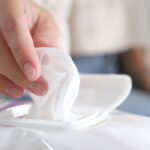 Parents are constantly looking for convenient ways to keep their baby clean and fresh. Baby wipes have become a staple in every diaper bag and nursery, providing an easy and effective way to clean up messes. However, there is a common question among parents: Can baby wipes be flushed? In this informative article, we will explore the truth about flushing baby wipes and why it can be detrimental to your toilet and pipes.
Parents are constantly looking for convenient ways to keep their baby clean and fresh. Baby wipes have become a staple in every diaper bag and nursery, providing an easy and effective way to clean up messes. However, there is a common question among parents: Can baby wipes be flushed? In this informative article, we will explore the truth about flushing baby wipes and why it can be detrimental to your toilet and pipes.
1. Understanding Baby Wipes:
Baby wipes are designed to be durable and resistant to tearing, making them ideal for cleaning up messes. However, these properties also make them problematic when it comes to flushing. Unlike toilet paper, which is specifically designed to break down in water, baby wipes are made from synthetic materials that do not easily disintegrate.
2. The Impact on Your Toilet:
When you flush baby wipes down the toilet, they can cause clogs and blockages in your plumbing system. Since baby wipes do not break down as easily as toilet paper, they can get caught in your pipes and create a blockage over time. This can lead to issues such as slow drainage, backups, and costly repairs. In severe cases, it may even require assistance from professional plumbers to clear the clog.
3. The Environmental Impact:
Flushing baby wipes is not only harmful to your plumbing, but it also has negative consequences for the environment. Unlike toilet paper, which is made from biodegradable materials, most baby wipes are made from non-biodegradable materials such as polyester or polypropylene. This means that when you flush them, they can end up in our waterways, contributing to pollution and harming marine life.
4. Alternatives to Flushing:
Instead of flushing baby wipes, it is recommended to dispose of them in the trash. Consider using a designated diaper disposal system or a sealable plastic bag to contain the used wipes. This not only helps prevent plumbing issues but also ensures that the wipes are disposed of properly and do not contribute to environmental pollution.
5. Flushable Wipes: Fact vs. Fiction:
You may come across wipes marketed as “flushable,” but it is important to approach these claims with caution. While some manufacturers claim that their wipes can be safely flushed, it is best to avoid flushing any wipes, including those labeled as flushable. These so-called flushable wipes still pose a risk of clogging your plumbing system, as they can take a significant amount of time to break down or encounter other obstacles in the pipes.
6. Educating Others:
One effective way to address the issue of flushing baby wipes is to spread awareness. Many people, including guests in your home, may not realize the impact of flushing wipes. Consider placing a polite note in your bathroom, kindly requesting that guests dispose of wipes in the trash rather than flushing them. This simple act can help prevent potential plumbing issues and protect our environment.
Conclusion:
While baby wipes are undoubtedly convenient and useful for parents, flushing them down the toilet can have dire consequences for your plumbing and the environment. Understanding the impact of flushing baby wipes is crucial for preventing clogs, blockages, and costly repairs. Remember, it is best to dispose of baby wipes in the trash, using proper disposal methods, to ensure the long-term health of your plumbing system and to minimize the environmental impact. By making this small adjustment to your routine, you can contribute to a cleaner and more sustainable future.

